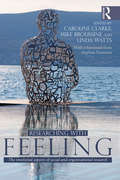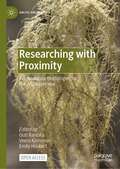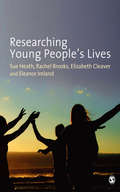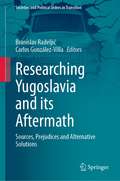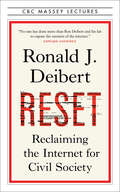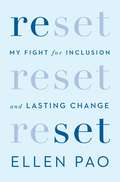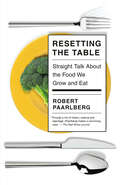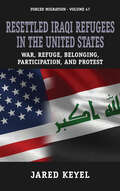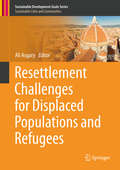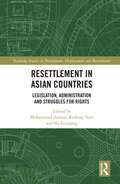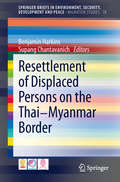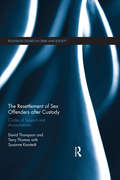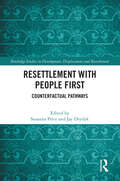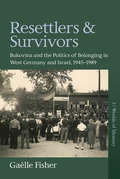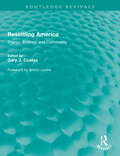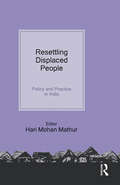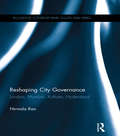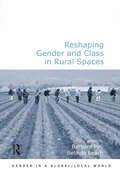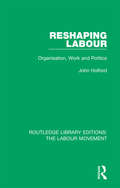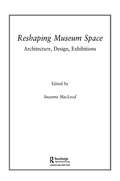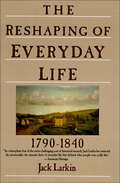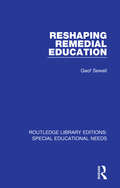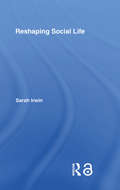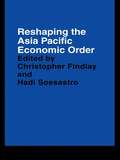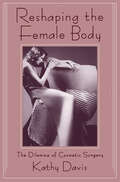- Table View
- List View
Researching with Feeling: The Emotional Aspects of Social and Organizational Research
by Caroline Clarke Mike Broussine Linda WattsWhy should researchers be interested in their feelings and emotions as they carry out research? Emotion is what it is to exist, to be human, and is present in every sphere of our lives. All activities are infused with emotion, even those that are constructed as ‘rational’, because rationality and emotionality are interpenetrated and entwined because all thinking is tinged with feeling, and all feeling is tinged with thinking. This book illuminates the emotional processes of doing social and organizational research, and the implications of this for the outcomes of research. With contributions from leading academics and research practitioners, it addresses the significant issue of the sometimes intense emotional experiences involved in doing research and the implications it has for the theory and practice of social research. By examining the nature of feelings and emotions, it explores how we might understand researchers’ emotions and experiences, and considers the often powerful feelings encountered in a variety of research contexts. Topics discussed include: power relations; psycho-social explanations of researcher emotions; paradoxical relations with research participants and the sometimes disturbing data that is gained; research supervision; the politics of research; gender; publishing, undergoing vivas and presenting at conferences. This book will therefore be a valuable companion to researchers and research students from the start of their career onwards.
Researching with Proximity: Relational methodologies for the Anthropocene (Arctic Encounters)
by Outi Rantala Veera Kinnunen Emily HöckertThis open access book presents a series of speculative, experimental modes of inquiry in the present times of environmental damage that have come to be known as the age of the Anthropocene. Throughout the book authors develop more nuanced ways of engaging with the environmentally vulnerable Arctic. They counter distancing, exoticising, and even apocalyptic imaginaries of the Arctic by staying proximate with mundane places and beings of the north. The volume engages and plays with familiar tourism concepts, such as hospitality, visiting, difference, care, openness, and distance, while expanding the focus from binary and human-centric approaches of hosts and guests to questions of wellbeing among multispecies communities. The transdisciplinary group of contributors share a curiosity about how staying proximate may provide theoretical depth and epistemological openings to attend to current tensions and to diversify the ways we do and enact research. Thus, each chapter provides a methodological experiment with proximity, developing diverse ways of envisioning and storying more-than-human worlds.
Researching Young People′s Lives
by Elizabeth Cleaver Eleanor Ireland Rachel Brooks Sue Heath′Researching young people′s lives will be useful to both the novice researcher and anyone interested in learning about new methods of practice′ - Youth Studies Australia Researching Young People′s Lives provides an overview of some of the key methodological challenges facing youth researchers and an introduction to the broad repertoire of methods used in youth-orientated research. The book is split into two sections. In the first half of the book, the authors consider the broad methodological and contextual concerns of relevance to the design and conduct of youth research, including ethical issues, the importance of context, and the rise of participatory approaches to youth research. The second part of the book focuses on the use of specific research methods in the conduct of youth research, ranging from surveys and secondary analysis through to interviewing, ethnography, visual methods, and the use of the internet in youth research. Throughout the book, the emphasis is on research in practice, and examples are drawn from recent youth research projects from a wide range of disciplines and substantive areas, and from a range of both UK and non-UK contexts. This is an ideal introduction to the field for novice researchers, in particular students studying and researching in the broad area of youth studies. It should also appeal to practitioners engaged in evaluation of service provision to young people, and to established youth researchers who might wish to explore the potential of using a different set of methods to those with which they are already familiar.
Researching Yugoslavia and its Aftermath: Sources, Prejudices and Alternative Solutions (Societies and Political Orders in Transition)
by Branislav Radeljić Carlos González-VillaIn Researching Yugoslavia and its Aftermath, a common thread is the authors’ path through the time and space context in which fieldwork has taken place. Accordingly, this collection tackles problems that have always existed but have not been dealt with in a single volume. In particular, it examines a range of methodological questions arising from the contributors’ shared concerns, and thus the obstacles and solutions characterising the relationship between researchers and their objects of study. Being an interdisciplinary project, this book brings together highly regarded historians, sociologists, anthropologists, political scientists, cultural and social theorists, as well as experts in architecture and communication studies. They share a belief that the awareness of the researcher’s own position in fieldwork is a precondition of utmost significance to comprehend the evolution of objects of study, and hence to ensure transparency and ultimate credibility of the findings. Moreover, the contributors come from diverse backgrounds, including authors from the former Yugoslavia and others who have made their way to the region after starting their research careers; some from universities in the area, others from institutions in the Global North. Here, they explore cross-cutting issues such as the repercussions of gender, nationality, institutional affiliation and the consequences of their entry into the field. This is examined in terms of the results of the research and the ethical aspect of the relationship with the object of study, as well as the implications of the chosen time framework in the methodological design and the clash between this decision and the interests of the actors studied.
Reset: Reclaiming the Internet for Civil Society
by Ronald DeibertIn the 2020 CBC Massey Lectures, bestselling author and renowned technology and security expert Ronald J. Deibert exposes the disturbing influence and impact of the internet on politics, the economy, the environment, and humanity. Digital technologies have given rise to a new machine-based civilization that is increasingly linked to a growing number of social and political maladies. Accountability is weak and insecurity is endemic, creating disturbing opportunities for exploitation. Drawing from the cutting-edge research of the Citizen Lab, the world-renowned digital security research group which he founded and directs, Ronald J. Deibert exposes the impacts of this communications ecosystem on civil society. He tracks a mostly unregulated surveillance industry, innovations in technologies of remote control, superpower policing practices, dark PR firms, and highly profitable hack-for-hire services feeding off rivers of poorly secured personal data. Deibert also unearths how dependence on social media and its expanding universe of consumer electronics creates immense pressure on the natural environment. In order to combat authoritarian practices, environmental degradation, and rampant electronic consumerism, he urges restraints on tech platforms and governments to reclaim the internet for civil society.
Reset: My Fight For Inclusion And Lasting Change
by Ellen PaoThe “necessary and incisive” (Roxane Gay) account of the discrimination case that “has blown open a conversation about the status of women” in the workplace (The New York Times)LONGLISTED FOR THE 2017 FINANCIAL TIMES AND MCKINSEY BUSINESS BOOK OF THE YEAR | NAMED A BEST FALL BOOK BY ELLE AND BUSTLE In 2015, Ellen K. Pao sued a powerhouse Silicon Valley venture capital firm, calling out workplace discrimination and retaliation against women and other underrepresented groups. Her suit rocked the tech world—and exposed its toxic culture and its homogeneity. Her message overcame negative PR attacks that took aim at her professional conduct and her personal life, and she won widespread public support—Time hailed her as “the face of change.” Though Pao lost her suit, she revolutionized the conversation at tech offices, in the media, and around the world. In Reset, she tells her full story for the first time. The daughter of immigrants, Pao was taught that through hard work she could achieve her dreams. She earned multiple Ivy League degrees, worked at top startups, and in 2005 was recruited by Kleiner Perkins, arguably the world’s leading venture capital firm at the time. In many ways, she did everything right, and yet she and other women and people of color were excluded from success—cut out of decisive meetings and email discussions, uninvited to CEO dinners and lavish networking trips, and had their work undercut or appropriated by male executives. It was time for a system reset. After Kleiner, Pao became CEO of reddit, where she took forceful action to change the status quo for the company and its product. She banned revenge porn and unauthorized nude photos—an action other large media sites later followed—and shut down parts of reddit over online harassment. She and seven other women tech leaders formed Project Include, an award-winning nonprofit for accelerating diversity and inclusion in tech. In her book, Pao shines a light on troubling issues that plague today’s workplace and lays out practical, inspiring, and achievable goals for a better future. Ellen K. Pao’s Reset is a rallying cry—the story of a whistleblower who aims to empower everyone struggling to be heard, in Silicon Valley and beyond.Praise for Reset“Necessary and incisive . . . As Ellen Pao detailed her experiences, while also communicating her passion for the work men often impeded her from doing, I was nothing short of infuriated. It was great to see a highly accomplished woman of color speaking out like this, and hopefully this book will encourage more women to come forward, give voice to their experiences in the workplace, and contribute to meaningful change.”—Roxane Gay“When women assert ourselves, we confirm the bias against us, unconscious and otherwise. When we speak out, we identify ourselves as troublemakers. This is why I look forward to reading Ellen Pao’s account of her tribulations in Silicon Valley.”—Catherine Mayer, New York Times“[Ellen Pao’s] bravery in filing the lawsuit made her a hero to many women and helped change the conversation around sexism in tech. Now, Pao is back . . . with a new book, Reset, which takes readers behind the scenes of the roller coaster she’s been on.”—Marie Claire
Resetting the Table: Straight Talk About the Food We Grow and Eat
by Robert PaarlbergA bold, science-based corrective to the groundswell of misinformation about food and how it's produced, examining in detail local and organic food, food companies, nutrition labeling, ethical treatment of animals, environmental impact, and every other aspect from farm to tableConsumers want to know more about their food--including the farm from which it came, the chemicals used in its production, its nutritional value, how the animals were treated, and the costs to the environment. They are being told that buying organic foods, unprocessed and sourced from small local farms, is the most healthful and sustainable option. Now, Robert Paarlberg reviews the evidence and finds abundant reason to disagree. He delineates the ways in which global food markets have in fact improved our diet, and how "industrial" farming has recently turned green, thanks to GPS-guided precision methods that cut energy use and chemical pollution. He makes clear that America's serious obesity crisis does not come from farms, or from food deserts, but instead from "food swamps" created by food companies, retailers, and restaurant chains. And he explains how, though animal welfare is lagging behind, progress can be made through continued advocacy, more progressive regulations, and perhaps plant-based imitation meat. He finds solutions that can make sense for farmers and consumers alike and provides a road map through the rapidly changing worlds of food and farming, laying out a practical path to bring the two together.
Resettled Iraqi Refugees in the United States: War, Refuge, Belonging, Participation, and Protest (Forced Migration #47)
by Jared KeyelThe American war against Iraq has caused hundreds of thousands of deaths and displaced millions of people. Between 20 March 2003 and 30 September 2017, more than 172,000 Iraqis resettled in the United States. This book explores the experiences of fifteen Iraqis who resettled in the US after 2003. It examines the long war against Iraq that began in 1991 and the decisions some Iraqis made to leave their homes and seek refuge in the United States. The book also delves into the possibilities for belonging and cultural exchange for this cohort of Iraqis and their political engagement with non-profit organizations, advocacy, and activism against the 2017 Travel Ban.
Resettlement Challenges for Displaced Populations and Refugees (Sustainable Development Goals Series)
by Ali AsgaryThe main focus of this book is to help better understand the multidimensionality and complexity of population displacement and the role that reconstruction and recovery knowledge and practice play in this regard. According to the UN Refugee Agency (UNHCR), the total number of people forcibly displaced due to wars and conflicts, disasters, and climate change worldwide, exceeded 66 million in 2016. Many of these displaced populations may never be able to go back and rebuild their houses, communities, and businesses.This text brings together recovery and reconstruction professionals, researchers, and policy makers to examine how displaced populations can rebuild their lives in new locations and recover from disasters that have impacted their livelihoods, and communities. This book provides readers with an understanding of how disaster recovery and reconstruction knowledge and practice can contribute to the recovery and reconstruction of displaced and refugee populations. This book will appeal to students, researchers, and professionals working in the field.
Resettlement in Asian Countries: Legislation, Administration and Struggles for Rights (Routledge Studies in Development, Displacement and Resettlement)
by Mohammad Zaman Reshmy Nair Shi GuoqingThis book examines land acquisition and resettlement experience in Asian countries, where nearly two-thirds of the world’s development-induced displacement currently takes place. Faced with the complexity of balancing legal frameworks and resettlement needs, along with increasing demands for safeguarding displaced peoples, in recent years many countries within Asia have adopted integrated land and resettlement laws. This book presents a comparative review and assessment of the impact of the new land and resettlement laws and regulatory frameworks for expropriation, compensation and resettlement. Written by an international, interdisciplinary team of experts from both practice and academia, the book demonstrates the ongoing challenges and struggles associated with social and resettlement risk assessments, the social and cultural exclusion of indigenous/vulnerable groups in some countries, and the lack of institutional capacity to adequately deal with resettlement management and administration. The case studies and comparative analyses of laws and practices relating to expropriation, compensation and resettlement make significant contributions to advancing resettlement knowledge and management practices. The book will be useful as a reference for development practitioners and for researchers across the fields of global development, political science, Asian studies, planning and law. The book also has potential use as a resource for resettlement management training programs and graduatelevel courses/seminars in development studies.
Resettlement of Displaced Persons on the Thai-Myanmar Border
by Benjamin Harkins Supang ChantavanichThis book is one of four volumes on a major empirical migration study by leading Thai migration specialists from Chulalongkorn University (Bangkok) for the United Nations Development Programme (UNDP). The camps on the Thai-Myanmar border are the result of the world's largest resettlement program. However, despite large-scale financial and human resource engagement, little research exists on how successful this resettlement has been. This book provides the first insight on how realistic the policy recommendations are for a durable solution for refugees at the borders. Practitioners and policymakers from governments, international organizations and NGOs will benefit from its findings. The volume is also helpful for anyone studying forced migration and its denouement in the age of globalization.
The Resettlement of Sex Offenders after Custody: Circles of Support and Accountability (Routledge Studies in Crime and Society)
by David Thompson Terry ThomasCircles of Support and Accountability is a voluntary initiative that assists people with convictions for sexual offences to resettle in the community. People leaving prison with such convictions often have difficulties in resettling. They carry the burden of the conviction itself, which may be both stigmatising and isolating, and they are the subject of sex offender register requirements, parole and other supervisory conditions. Circles of Support and Accountability in the UK started over ten years ago and have slowly spread across the country. They work closely with the police and probation services but rely entirely on volunteers prepared to give up their time to work with people often otherwise shunned by communities. Circles offer support to the person concerned but also hold them accountable for their future behaviour. They aim to ensure there are ‘no more victims’. This book is based on original research and provides a close-up picture of how these Circles of Support and Accountability work in practice. It brings together for the first time the voices of all the participants, from the offenders and the volunteers through to the Coordinators who link the volunteers to the professionals in the form of the police and probation services. The research was commissioned by Circles UK and funded by the Wates Foundation and the University of Leeds, School of Law.
Resettlement with People First: Counterfactual Pathways (Routledge Studies in Development, Displacement and Resettlement)
by Jay DrydykShould people in the way lose out as new reservoirs, mines, plantations, or superhighways displace them from their homes and livelihoods? What if the process of resettlement were made accountable to those impacted, empowering them to achieve just outcomes and to share in the benefits of development projects? This book seeks to answer these questions, putting forward powerful counterfactual case studies to assess what problems real-world development projects would likely have avoided if the project had included the affected people in decision making about whether and how they should resettle. Drawing on contributions from leading and emerging scholars from around the world, this book considers cases involving dams, mines, roads, and housing, amongst others, from Asia, Africa, and South America. In each case, the counterfactual approach invites us to reconsider how the dynamics of accountability play out through resettlement hazards and the asymmetries of power relations in the negotiation of displacement benefits and redress. Considering a range of theoretical and ethical perspectives, the book concludes with practical, alternative policy suggestions for displacement arising both from development and from slow onset climate change. This book’s novel approach focussing on the people's agency in the dynamics of governance, accountability, and (dis)empowerment in development projects with displacement and resettlement will appeal to academic researchers, development practitioners, and policymakers.
Resettlers and Survivors: Bukovina and the Politics of Belonging in West Germany and Israel, 1945–89 (Worlds of Memory #3)
by Gaëlle FisherLocated on the border of present-day Romania and Ukraine, the historical region of Bukovina was the site of widespread displacement and violence as it passed from Romanian to Soviet hands and back again during World War II. This study focuses on two groups of “Bukovinians”—ethnic Germans and German-speaking Jews—as they navigated dramatically changed political and social circumstances in and after 1945. Through comparisons of the narratives and self-conceptions of these groups, Resettlers and Survivors gives a nuanced account of how they dealt with the difficult legacies of World War II, while exploring Bukovina’s significance for them as both a geographical location and a “place of memory.”
Resettling America: Energy, Ecology and Community (Routledge Revivals)
by Gary J. CoatesEvery movement has its bellweathers, the ideas that lead the way and rally its adherents towards a set of shared values and visions. Resettling America was one such beacon – a publication for its time and ahead of its time. Those of us doing the work of sustainability and the transformation of communities feel grateful for Gary’s early and prescient contribution that has shaped the thinking of so many around the US and beyond. Essential reading for all green warriors! Jason F. McLennan, Chief Sustainability Officer – Perkins & Will. Founder, Living Building Challenge. Originally published in 1981 and now reissued with a new Preface by Gary J. Coates, Resettling America was one of the first comprehensive, transdisciplinary books on the crisis of sustainability and the implications of that crisis for the re-design of buildings, towns, cities and regions. Through essays by Coates, which provide a theory of ecological design, and case studies written by leading authors and activists of the time, the book presents a strategic vision of how it would be possible to create a sustainable and livable society through a process of cooperative community development rooted in a radical re-visioning of nature, self and society. By providing a strategic vision, as well offering practical means for creating a sustainable society worth sustaining, Resettling America remains more relevant and inspiring than ever to those who face the ecology of crises that now surround us in the 21st Century.
Resettling Displaced People: Policy and Practice in India
by Hari Mohan MathurDevelopmental projects have long been displacing people in large numbers every year, but it is only in recent years that the fate of those adversely affected has become an issue of widespread concern requiring urgent action. This volume is the scholarly exploration of these critical issues in a wider perspective, examining resettlement policies as well as resettlement strategies, their strengths, their weaknesses, the persisting gap between policy and its actual practice and the means to improve resettlement outcomes. This volume is well-structured into four parts: (a) Displacement and Resettlement in Developmental Projects (b) Re-examining Resettlement Policies (c) Addressing Resettlement Concerns and (d) Resettlement in a Globalizing World. It goes beyond the common description of resettlement problems and attempts at gaining a deeper understanding of resettlement realities. In a separate section, the book discusses the hotly debated current issues of resettlement policy and practice in the context of globalization. The volume contains original case studies which will bring to academic and policy tables a body of important new ideas that will stimulate debates and also hopefully change and improve current practices. The contributors to this volume are eminent scholars, including some who have played a vital role in shaping resettlement policies as well as in implementing projects at the grassroots level.
Reshaping City Governance: London, Mumbai, Kolkata, Hyderabad (Routledge Contemporary South Asia Series)
by Nirmala RaoIndia’s cities are in the midst of an unprecedented urban expansion. While India is acknowledged as a rising power, poised to emerge into the front rank of global economies, the pace and scale of its urbanisation calls for more effective metropolitan management if that growth is not to be constrained by gathering urban crisis. This book addresses some key issues of governance and management for India’s principal urban areas of Mumbai, Kolkata and Hyderabad. As three of the greatest Indian cities, they have evolved in recent decades into large metropolitan regions with complex, overlapping and often haphazard governance arrangements. All three cities exemplify the challenges of urbanisation and serve here as case studies to explore the five dimensions of urban governance in terms of devolution, planning, structures of delivery, urban leadership and civic participation. London, with its recent establishment of a directly elected Mayor, provides a reference point for this analysis, and signifies the extent to which urban leadership has moved to the top of the urban governance agenda. In arguing the case for reform of metropolitan governance, the book demonstrates that it would be too simplistic to imagine that London’s institutional structure can be readily transposed on to the very different political and cultural fabric of India’s urban life. Confronting India’s urban crisis with a comparative analysis that identifies the limits of policy transfer, the book will be particularly valuable to students and scholars of Politics, Governance, and Urban studies.
Reshaping Gender and Class in Rural Spaces (Gender in a Global/Local World)
by Belinda LeachLeach and Pini bring together empirical and theoretical studies that consider the intersections of class, gender and rurality. Each chapter engages with current debates on these concepts to explore them in the context of contemporary social and economic transformations in which global processes that reconstitute gender and class interconnect with and take shape in a particular form of locality - the rural. The book is innovative in that it: - responds to calls for more critical work on the rural 'other' - contributes to scholarship on gender and rurality, but does so through the lens of class. This book places the question of gender, rurality and difference at its centre through its focus on class - addresses the urban bias of much class scholarship as well as the lack of gender analysis in much rural and class academic work - focuses on the ways that class mediates the construction and practices of rural men/masculinities and rural women/femininities - challenges prevalent (and divergent) assumptions with chapters utilising contemporary theorisations of class With the empirical strongly grounded in theory, this book will appeal to scholars working in the fields of gender, rurality, identity, and class studies.
Reshaping Labour: Organisation, Work and Politics (Routledge Library Editions: The Labour Movement #16)
by John HolfordFirst published in 1988. In a few short years during and just after the Great War, the Labour Party and the trade unions established themselves firmly at the centre of the British political and industrial scene. But at the same time, the politics and organisation of both Labour and unions were reshaped. This is a grass-roots study of a key period in the building of Labour’s political and industrial base. It is a study of how unions and Labour were organised and motivated to seize their moments of destiny – and of how a new political industrial movement was limited by the common-sense of the age in which it was born. It is a study of shifting support for various Labour and Communist political and industrial strategies – of the pressures and struggles which reshaped the movement, stamping on it the character we know today. And it is a study of how labour – at work and in the community – responded to war, to prosperity, to depression.
Reshaping Museum Space: Architecture, Design, Exhibitions (Museum Meanings)
by Suzanne MacLeodReshaping Museum Space pulls together the views of an international group of museum professionals, architects, designers and academics highlights the complexity, significance and malleability of museum space, and provides reflections upon recent developments in museum architecture and exhibition design. Various chapters concentrate on the process of architectural and spatial reshaping, and the problems of navigating the often contradictory agendas and aspirations of the broad range of professionals and stakeholders involved in any new project. Contributors review recent new build, expansion and exhibition projects questioning the types of museum space required at the beginning of the twenty-first century and highlighting a range of possibilities for creative museum design. Essential reading for anyone involved in creating, designing and project managing the development of museum exhibits, and vital reading for students of the discipline.
The Reshaping of Everyday Life, 1790–1840: 1790-1840
by Jack LarkinA fascinating history of the daily lives of Americans in the first fifty years of the new republic, told often in their own words.The years between the patrician leadership of George Washington and the campaign that elected William Henry Harrison marked a period of startling changes in American life. However, most American were enmeshed in the myriad ordinary concerns of their lives, and although deeply affected by the great events of the time, their concern with them was intermittent. Jack Larkin describes the often gritty texture of life as these Americans experienced it, weaving the disparate threads of everyday life into the rich, complicated tapestry of American history during this transitional period.“Recounting the customs and styles of life of ordinary people during a period of rapid and unsettling social and economic change, Jack Larkin, the chief historian at Old Sturbridge Village, the outdoor history museum in Sturbridge, Mass., illuminates an astonishing range of activities. These include infant feeding; the care of chamber pots, privies and grave yards; the use of broadside ballads, parlor songs and communal dances; the celebration of holidays and routines of travel; the production, design and use of clothing and household items; even the treatment of pets. Habits of speech and manners are sketched, as well as broad patterns of work, religion, sexuality and family life. Virtually all human activity in the late eighteenth and early nineteenth centuries comes in for scrutiny in this compact and insightful work.” —The New York Times Book Review“Jack Larkin has retrieved the irretrievable; the intimate facts of everyday life that defined what people were really like.” —American Heritage
Reshaping Remedial Education (Routledge Library Editions: Special Educational Needs #50)
by Geof SewellFirst published in 1982. After the economic crises of the late seventies and early eighties, remedial education was affected particularly badly. Due to lack of funding, a child had to be labelled and diagnosed before they could receive any remedial education. For some children this labelling produced unintended and destructive consequences. The author examines this context of failure, and analyses various approaches to remedial education.
Reshaping Social Life
by Sarah IrwinCaught up in current social changes, we do not fully understand the reshaping of social life. In sociological analyses there is a conceptual gap between subjectivities and social structural processes, and we face real difficulties in understanding social change and diversity. Through analysis of key areas of social life, here, Sarah Irwin develops a new and exciting resource for better understanding our changing social world. Breaking with conventional approaches and reconnecting the subjective with the objective, Irwin’s book develops a new conceptual and analytical perspective with social relationality, interdependence and social context at its heart. The new perspective is developed through grounded analyses of empirical evidence, and draws on new data. It explores and analyzes: * significant changes in family forms, fertility, gender relations and commitments to employment, children and care, both now, and with comparisons to early twentieth century developments * the meshing of norms and social relations in contexts of change* diverse values, norms and perceptions of fairness, analyzed with respect to diversity over the life course, and in respect of gender, ethnicity and social class. Through analysis of context, Irwin offers new insights, and tackles puzzles of explanation. Reshaping Social Life offers a fascinating and innovative way of slicing into and re-interrogating our changing social world, and is sure to become a landmark resource for students, scholars and researchers.
Reshaping the Asia Pacific Economic Order (PAFTAD (Pacific Trade and Development Conference Series))
by Hadi Soesastro Christopher FindlayRelationships and alignments among the nations of the world’s most populous and productive region, the Asia Pacific, are in flux. Current global political, economic and security uncertainty, heightened by 9/11 and the subsequent War on Terror, has fuelled a reassessment by many Asia Pacific nations about the structure and form of future economic and political cooperation and development. Featuring contributions from some of the most eminent and influential economists and political scientists in the Asia Pacific region, this book explores the forces reshaping the Asia Pacific economic order, and where these changes may lead. Focusing on the origins of the shift towards policy driven integration, the book examines what new structures may eventually emerge on both sides of the Pacific, the ways in which this shift will affect the progress of economic integration and how cross-Pacific relations will therefore be affected.
Reshaping the Female Body: The Dilemma of Cosmetic Surgery
by Kathy DavisFirst Published in 1995. Routledge is an imprint of Taylor & Francis, an informa company.
